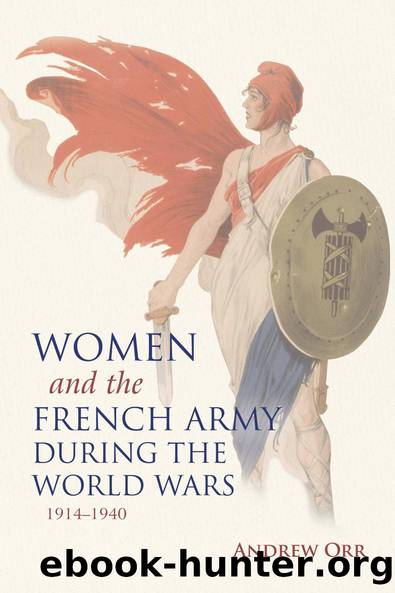Women and the French Army during the World Wars, 1914â1940 by Andrew Orr

Author:Andrew Orr [Orr, Andrew]
Language: eng
Format: epub
Tags: History, Military, World War I, Women
ISBN: 9780253026781
Google: XpoqDwAAQBAJ
Publisher: Indiana University Press
Published: 2017-05-01T01:10:06+00:00
OPPOSITION TO CARTELâS REFORMS
Faced with a government committed to a maximum of one year of conscript service, and flirting with even more radical reforms, army leaders initially resisted any more cuts in the term of service. Motivated by its membersâ concern about the armyâs eroding combat power and fear of indiscipline in the ranks, the Conseil Supérieur de la Guerre unanimously rejected any further reduction.
On March 30, 1925, Marshal Pétain took the lead in criticizing plans to reduce the armyâs size. He complained that the government had not fulfilled the promises it made in the 1923 Army Law to increase the numbers of career soldiers and insisted that the generals would not agree to new cuts until the old promises were kept. Pétain argued that the Cartel cabinetâs proposals were poorly thought out and focused more on the problem of conscription being unpopular than on a workable solution. He explained that âeverybody is in agreement on this point: the existing organization must be modified. But, in what sense? There the problem becomes more complicated and the solution less certain.â Later in the meeting he criticized the postwar cabinets for continually changing the term of military service and the armyâs organization, complaining that, since 1923, the armyâs legal status had been âessentially provisional; it could be said that it no longer has a legal status.â General Maxime Weygand added that rather than the 75,000 career soldiers suggested by the Radical Partyâdominated Herriot cabinet, the army required 150,000 and a further increase in civilian employees.29
On April 1 1925, the council again resisted the cabinetâs proposals. The generals vehemently objected to the cabinetâs use of the term armée nationale to describe the mobilized force and instead demanded the bill be amended to use the phrase armée de guerre. This semantic debate revealed the generalsâ fear that their power and prestige was being threatened by a move to short-service conscription. The word nationale was loaded with symbolic meaning, and its use implied that the wartime army of recalled reservists was the true and authentic military manifestation of the French people, while the peacetime army, which was dominated by career officers and noncommissioned officers was just a placeholder. The phrase armée de guerre stripped away the symbolic meaning of the word nationale and replaced it with a mere reference to the wartime incarnation of the French Army.30
During the meeting a seemingly technical debate about whether the proposed law should specify the organization of units or if it should be left to the discretion of the minister of war sparked a disagreement between the military and civilian members. Marshals Ferdinand Foch and Philippe Pétain and Generals Marie-Eugène Debeney, Adolphe Guillaumat, and Maxime Weygand argued that the bill should specify the internal organization of military units and that the cabinet should accept the councilâs advice on that point. After the council supported Pétain and the senior generals, the minister of war, General Charles Nollet, rejected Pétainâs position and insisted that as minister he had the right to overrule the council.
Download
This site does not store any files on its server. We only index and link to content provided by other sites. Please contact the content providers to delete copyright contents if any and email us, we'll remove relevant links or contents immediately.
The Radium Girls by Kate Moore(12018)
100 Deadly Skills by Clint Emerson(4921)
Rise and Kill First by Ronen Bergman(4780)
The Templars by Dan Jones(4682)
The Doomsday Machine by Daniel Ellsberg(4484)
The Rape of Nanking by Iris Chang(4203)
Killing England by Bill O'Reilly(3996)
Stalin by Stephen Kotkin(3957)
Hitler in Los Angeles by Steven J. Ross(3942)
12 Strong by Doug Stanton(3541)
Hitler's Monsters by Eric Kurlander(3329)
Blood and Sand by Alex Von Tunzelmann(3195)
The Code Book by Simon Singh(3180)
Darkest Hour by Anthony McCarten(3119)
The Art of War Visualized by Jessica Hagy(3001)
Hitler's Flying Saucers: A Guide to German Flying Discs of the Second World War by Stevens Henry(2752)
Babylon's Ark by Lawrence Anthony(2673)
The Second World Wars by Victor Davis Hanson(2521)
Tobruk by Peter Fitzsimons(2509)
